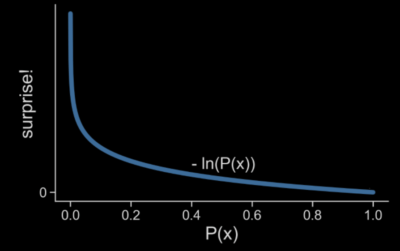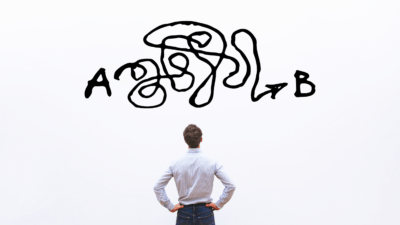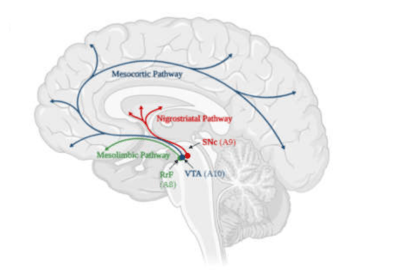The Feeling of Free Energy
In this article I’ll be introducing you to a metacognitive skill: the feeling of free energy.
The key idea here is that we can enhance intelligence by using self-awareness and feeling to guide our IQ-demanding cognitive work- solving problems, decision-making and so on.
In this article you’ll learn about the important concept of free energy and an exercise you can do to improve the feeling for free energy.
Free energy definition
Free energy is a measure of how unpredictable, unexpected or uncertain some experience is, given our understanding of the world and our capabilities.
Technically the more improbable an event is to us, the more free energy there is as shown in the ‘surprisal’ function here.

So free energy is a violation of what we expect – where something is unlikely, strange, or there’s a reality gap between our beliefs and the evidence, or our intentions and the actual outcomes.
The feeling of free energy
So how can we feel free energy?
- We can experience it as puzzlement or bewilderment or surprise when something doesn’t make sense.
- We can feel it as a sense of uncertainty or risk.
- We can experience it as excitement, when an unexpected opportunity arises.
- We can experience it as anguish, anger or frustration, when we don’t attain a goal we expect .
- We can even experience it as chronic stress or anxiety, if we are in a general position where we are out of control, lack understanding or under threat.
Why is the feeling of free energy important for IQ?
First, because intelligence evolved for effective problem solving – and problems can be defined by free energy.
The bigger the problem, the more the free energy!

Intelligence is needed when automatic pilot mode is not enough – in other words, when there is some gap in understanding or ability that needs to be overcome.
Being smart means being able to reduce free energy efficiently – to close a gap in our understanding or a gap between intentions and our goals. We can only do this if we know it’s there in the first place. Training our feeling for free energy is a powerful way of achieving this.
Second, free energy is critical for the neurobiology of learning and motivation involving mid-brain dopamine signaling.

Research tells us it’s not the reward (or punishment) in itself that reinforces behaviours but the gap between the expected value of rewards or punishments and their actual value. This is known as the reward prediction error (RPE) – another term for free energy. And this is the signal that drives dopamine signalling in for strengthening memory traces in learning.
And third, the feeling for free energy helps us with cognitive resilience. Compared to when we are on automatic pilot mode, using our intelligence to process free energy problems is metabolically costly, When there is too much free energy to process in our lives, it can lead to chronic stress, burnout, inflammation and exhaustion. Having a better feeling for free energy can help us manage it.
Summary
The above is an introduction to free energy and the feeling of free energy – and I’ve explained why this EQ skill is critical for general intelligence (g) and IQ.
Free energy helps us know what we need to attend to, and what we can learn from.
It’s the energy source of all our problem solving – and by effectively reducing free energy through finding solution, we can turn that free energy into knowledge and motivated action.
Mindware Skill Training
Applying the ‘rule of 10’ try this 10 times within 1- 2 weeks:
- Identify a problem that gets your attention and note the feeling of free energy that comes with the problem.
This feeling is a source of motivational energy.
Pick problems you can solve or complete if it’s goal.
2. After solving the problem, reflect on the feeling of pleasure or relief you may feel from doing so. This may be quite subtle. This feeling is a reward signal, and being aware of it will enhance the learning process.
And that’s it!
Do this 10 times, and you should have learned this useful free energy ‘mindware skill’. Learn to feel problems, not just analyse them!
Consider using a to-do app such as Stripes or Productive to help with ensuring you apply the ‘rule of 10’ to learn this skill properly.
Good luck!
.